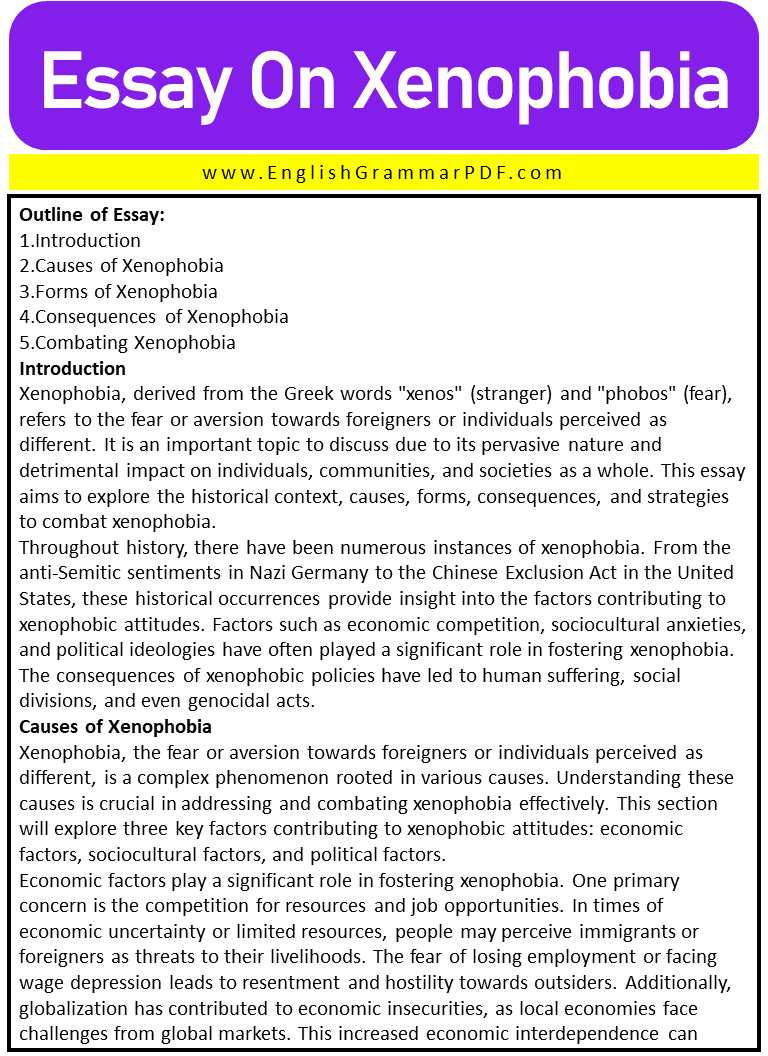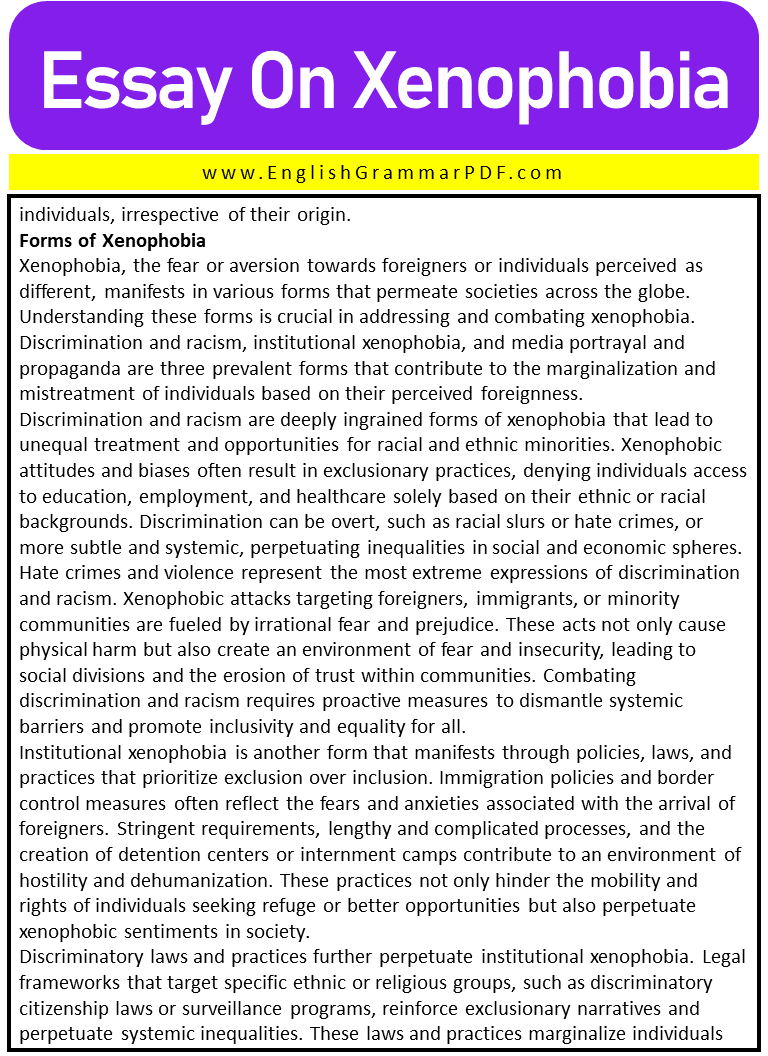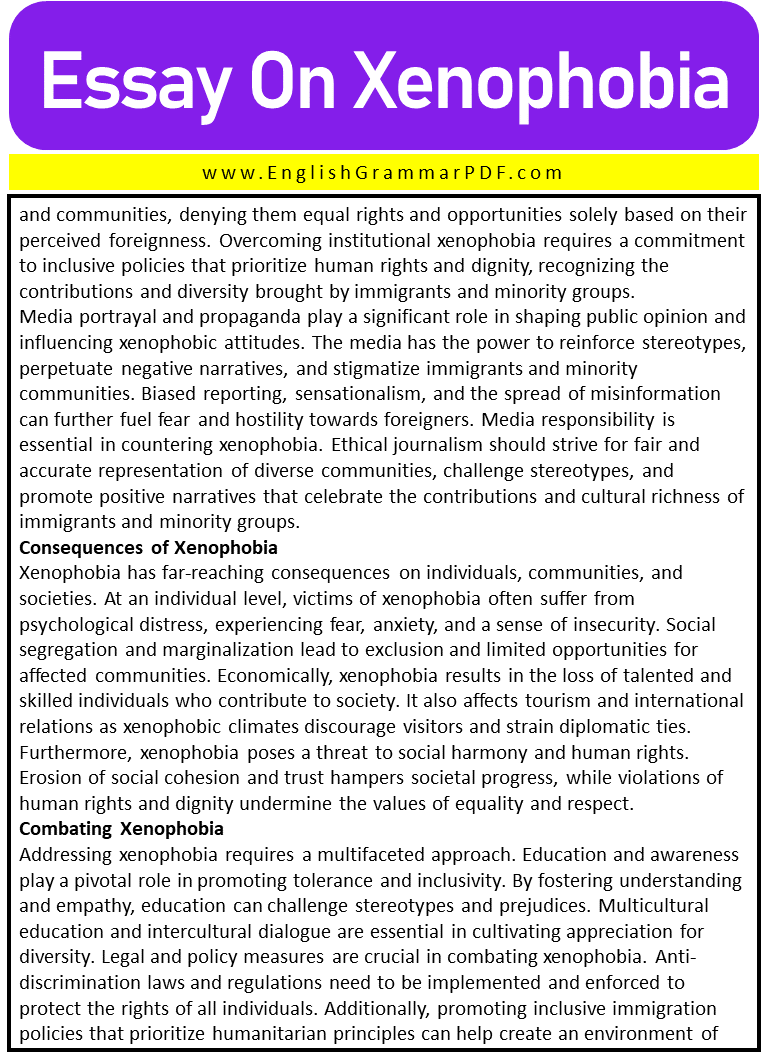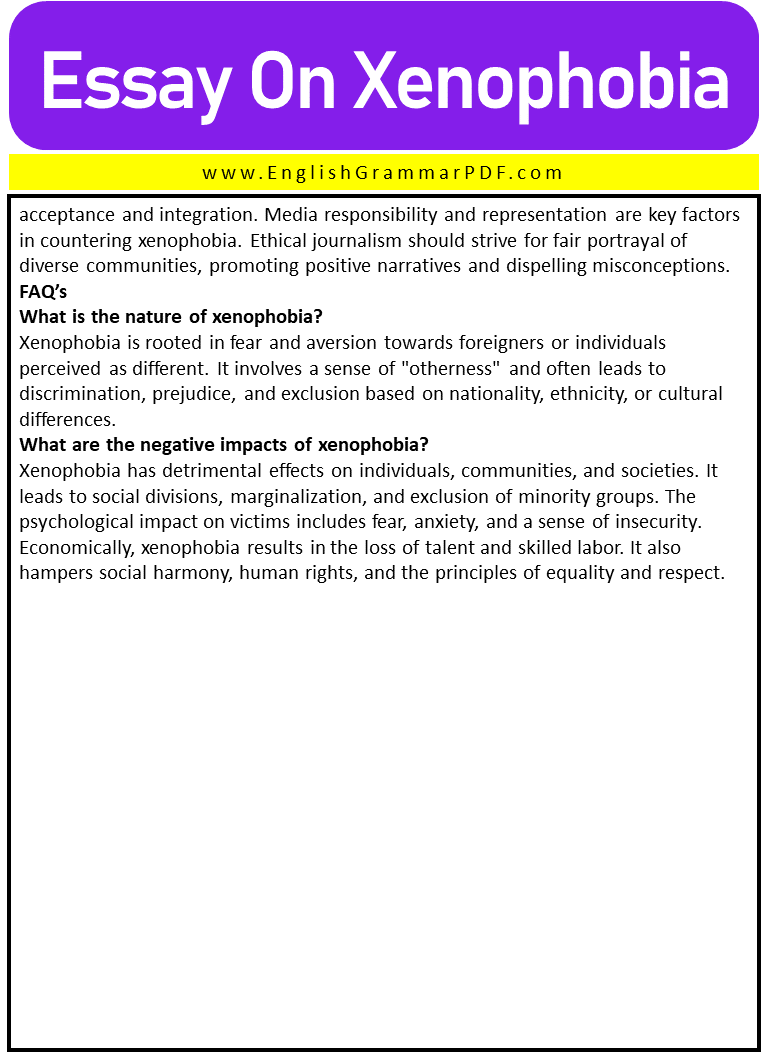Essay On Xenophobia
Outline of Essay:
- Introduction
- Causes of Xenophobia
- Forms of Xenophobia
- Consequences of Xenophobia
- Combating Xenophobia
Introduction
Xenophobia, derived from the Greek words “xenos” (stranger) and “phobos” (fear), refers to the fear or aversion towards foreigners or individuals perceived as different. It is an important topic to discuss due to its pervasive nature and detrimental impact on individuals, communities, and societies as a whole. This essay aims to explore the historical context, causes, forms, consequences, and strategies to combat xenophobia.
Throughout history, there have been numerous instances of xenophobia. From the anti-Semitic sentiments in Nazi Germany to the Chinese Exclusion Act in the United States, these historical occurrences provide insight into the factors contributing to xenophobic attitudes. Factors such as economic competition, sociocultural anxieties, and political ideologies have often played a significant role in fostering xenophobia. The consequences of xenophobic policies have led to human suffering, social divisions, and even genocidal acts.
Causes of Xenophobia
Xenophobia, the fear or aversion towards foreigners or individuals perceived as different, is a complex phenomenon rooted in various causes. Understanding these causes is crucial in addressing and combating xenophobia effectively. This section will explore three key factors contributing to xenophobic attitudes: economic factors, sociocultural factors, and political factors.
Economic factors play a significant role in fostering xenophobia. One primary concern is the competition for resources and job opportunities. In times of economic uncertainty or limited resources, people may perceive immigrants or foreigners as threats to their livelihoods. The fear of losing employment or facing wage depression leads to resentment and hostility towards outsiders. Additionally, globalization has contributed to economic insecurities, as local economies face challenges from global markets. This increased economic interdependence can create a sense of vulnerability and foster xenophobic sentiments.
Sociocultural factors also contribute to xenophobia. Fear of cultural assimilation or erosion of national identity is a common concern. Cultural traditions, language, and values hold significant importance for many individuals and communities. The arrival of immigrants with different customs and practices can lead to apprehension about the preservation of cultural heritage. In some cases, this fear is grounded in the perception that cultural diversity threatens social cohesion. Stereotyping and prejudice further exacerbate these sociocultural anxieties, as negative generalizations about specific ethnic or religious groups perpetuate fear and mistrust.
Political factors are instrumental in fueling xenophobic sentiments. Nationalistic ideologies that prioritize the interests of the native population over those of foreigners often foster xenophobic attitudes. Politicians may employ populist rhetoric that capitalizes on people’s fears and insecurities, using xenophobia as a means to consolidate support and maintain power. By scapegoating immigrants or minorities, political leaders redirect public frustration and dissatisfaction towards vulnerable groups, diverting attention from other pressing issues. The role of political leaders in shaping public opinion cannot be underestimated, as their words and actions have a significant impact on the prevalence of xenophobia.
It is essential to recognize that these causes of xenophobia are often interconnected and reinforce each other. Economic anxieties can heighten sociocultural fears, while political rhetoric can amplify economic and sociocultural insecurities. Moreover, xenophobia is not limited to specific regions or cultures; it can manifest in societies around the world, although the specific dynamics and manifestations may vary.
Addressing xenophobia requires a comprehensive approach that tackles these underlying causes. Economic policies should aim to alleviate concerns by promoting inclusive growth, creating job opportunities, and ensuring fair labor practices. Social integration efforts should focus on fostering understanding, respect, and appreciation for diverse cultures and backgrounds. Education plays a crucial role in promoting tolerance and challenging stereotypes. By providing accurate information and encouraging critical thinking, education can debunk myths and misconceptions that fuel xenophobia. Lastly, political leaders must take responsibility for their rhetoric and promote inclusive policies that respect the rights and dignity of all individuals, irrespective of their origin.
Forms of Xenophobia
Xenophobia, the fear or aversion towards foreigners or individuals perceived as different, manifests in various forms that permeate societies across the globe. Understanding these forms is crucial in addressing and combating xenophobia. Discrimination and racism, institutional xenophobia, and media portrayal and propaganda are three prevalent forms that contribute to the marginalization and mistreatment of individuals based on their perceived foreignness.
Discrimination and racism are deeply ingrained forms of xenophobia that lead to unequal treatment and opportunities for racial and ethnic minorities. Xenophobic attitudes and biases often result in exclusionary practices, denying individuals access to education, employment, and healthcare solely based on their ethnic or racial backgrounds. Discrimination can be overt, such as racial slurs or hate crimes, or more subtle and systemic, perpetuating inequalities in social and economic spheres.
Hate crimes and violence represent the most extreme expressions of discrimination and racism. Xenophobic attacks targeting foreigners, immigrants, or minority communities are fueled by irrational fear and prejudice. These acts not only cause physical harm but also create an environment of fear and insecurity, leading to social divisions and the erosion of trust within communities. Combating discrimination and racism requires proactive measures to dismantle systemic barriers and promote inclusivity and equality for all.
Institutional xenophobia is another form that manifests through policies, laws, and practices that prioritize exclusion over inclusion. Immigration policies and border control measures often reflect the fears and anxieties associated with the arrival of foreigners. Stringent requirements, lengthy and complicated processes, and the creation of detention centers or internment camps contribute to an environment of hostility and dehumanization. These practices not only hinder the mobility and rights of individuals seeking refuge or better opportunities but also perpetuate xenophobic sentiments in society.
Discriminatory laws and practices further perpetuate institutional xenophobia. Legal frameworks that target specific ethnic or religious groups, such as discriminatory citizenship laws or surveillance programs, reinforce exclusionary narratives and perpetuate systemic inequalities. These laws and practices marginalize individuals and communities, denying them equal rights and opportunities solely based on their perceived foreignness. Overcoming institutional xenophobia requires a commitment to inclusive policies that prioritize human rights and dignity, recognizing the contributions and diversity brought by immigrants and minority groups.
Media portrayal and propaganda play a significant role in shaping public opinion and influencing xenophobic attitudes. The media has the power to reinforce stereotypes, perpetuate negative narratives, and stigmatize immigrants and minority communities. Biased reporting, sensationalism, and the spread of misinformation can further fuel fear and hostility towards foreigners. Media responsibility is essential in countering xenophobia. Ethical journalism should strive for fair and accurate representation of diverse communities, challenge stereotypes, and promote positive narratives that celebrate the contributions and cultural richness of immigrants and minority groups.
Consequences of Xenophobia
Xenophobia has far-reaching consequences on individuals, communities, and societies. At an individual level, victims of xenophobia often suffer from psychological distress, experiencing fear, anxiety, and a sense of insecurity. Social segregation and marginalization lead to exclusion and limited opportunities for affected communities. Economically, xenophobia results in the loss of talented and skilled individuals who contribute to society. It also affects tourism and international relations as xenophobic climates discourage visitors and strain diplomatic ties. Furthermore, xenophobia poses a threat to social harmony and human rights. Erosion of social cohesion and trust hampers societal progress, while violations of human rights and dignity undermine the values of equality and respect.
Combating Xenophobia
Addressing xenophobia requires a multifaceted approach. Education and awareness play a pivotal role in promoting tolerance and inclusivity. By fostering understanding and empathy, education can challenge stereotypes and prejudices. Multicultural education and intercultural dialogue are essential in cultivating appreciation for diversity. Legal and policy measures are crucial in combating xenophobia. Anti-discrimination laws and regulations need to be implemented and enforced to protect the rights of all individuals. Additionally, promoting inclusive immigration policies that prioritize humanitarian principles can help create an environment of acceptance and integration. Media responsibility and representation are key factors in countering xenophobia. Ethical journalism should strive for fair portrayal of diverse communities, promoting positive narratives and dispelling misconceptions.
FAQ’s
What is the nature of xenophobia?
Xenophobia is rooted in fear and aversion towards foreigners or individuals perceived as different. It involves a sense of “otherness” and often leads to discrimination, prejudice, and exclusion based on nationality, ethnicity, or cultural differences.
What are the negative impacts of xenophobia?
Xenophobia has detrimental effects on individuals, communities, and societies. It leads to social divisions, marginalization, and exclusion of minority groups. The psychological impact on victims includes fear, anxiety, and a sense of insecurity. Economically, xenophobia results in the loss of talent and skilled labor. It also hampers social harmony, human rights, and the principles of equality and respect.
Explore More Essays:
Download the PDF of Essay








